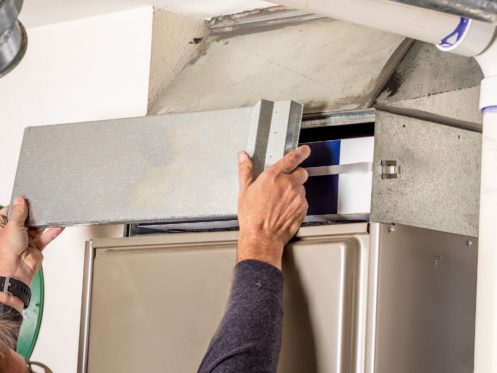A furnace filter is an essential part of your home’s heating and cooling system. As the name suggests, it functions to filter out dust and debris from your HVAC system in order to protect your furnace, AC unit and ventilation system and keep everything functioning efficiently and effectively. Depending on the type and quality of the filter, it may also help to filter out allergens and pollutants such as pollen and pet dander. The only problem is that, with such a huge variety of different filters available, it can be difficult to determine which one is best for your home. With that in mind, here is a quick overview of furnace filters and their features.
Understanding Furnace Filter Ratings
The most important thing to pay attention to when shopping for a new furnace filter is the efficiency rating. In most cases, the efficiency is expressed in terms of the MERV (minimum efficiency reporting value) rating. This system ranks filters based on their overall efficiency, which is expressed by a value from 1 to 20, with 1 being the lowest rating and 20 being the highest. However, some manufacturers, like 3M, use their own rating systems, which can add to the confusion. Nonetheless, all of these various rating systems work in the same way, with the higher numbers indicating a higher efficiency rating.
Types of Furnace Filters
Not only do furnace filters come in a variety of ratings, but they are also available in a wide variety of types. For instance, you can find both disposable filters and washable filters, pleated and non-pleated filters, and even filters that are electrostatically charged.
The vast majority of homeowners tend to choose disposable filters over the washable variety simply for convenience. Nonetheless, if you’re willing to wash and clean your filter every few months, you can save quite a bit of money by choosing a washable filter instead of the disposable type.
In terms of pleated and non-pleated filters, most HVAC professionals recommend that you always choose a pleated filter. Non-pleated filters tend to be much cheaper and provide better airflow. Unfortunately, they also tend to be far less efficient at filtering out dust, debris and allergens. As a result, they have a lower rating. Therefore, if you are concerned about indoor air quality, a pleated filter is almost always the best choice. However, your HVAC technician will also take into account your fan’s ability to pull air through a denser filter and may recommend something with a lower rating for the longevity of the furnace. It is best to ask a professional about this to see what your home’s individual needs are.
Electrostatic filters tend to perform far better than other types of filters. The reason behind this is that most particles in the air contain an electric charge, which means that the electrostatic filter can actually attract these particles and thus filter them out more easily and effectively. Of course, this added efficiency also means that electrostatic filters tend to cost quite a bit more than standard, non-charged filters.
One final thing you’ll need to pay attention to when choosing a filter is the size and thickness. Your HVAC system is designed to work with a specifically sized filter. This means it is important that you choose the right size for your specific system. The vast majority of residential HVAC systems use a 1-inch-thick filter, but you can also find systems that fit anywhere from a 2- to 5-inch filter. Luckily, finding the right size of filter for your system is as simple as looking at your existing filter and choosing one that is the same size and thickness.
Price vs. Performance: Choosing the Best Filter for Your Needs
Generally speaking, most residential furnace filters tend to have a MERV rating somewhere between 6 and 12. Still, most experts recommend choosing a filter with a MERV rating of at least 10 as these filters are far more effective at filtering out allergens to improve indoor air quality. Of course, the higher the MERV rating is, the more the filter will tend to cost.
This is important since you should really be changing out your filter every few months, which means you will likely end up spending much more money if you choose to go with a much higher-rated filter. Therefore, it is about finding a balance between price and performance. In most cases, going with anything above a MERV 12 filter in your home is probably overkill and will see you end up spending much more money on replacement filters without much of a noticeable improvement in performance. Not only that, but if the filter is too efficient, it could actually end up restricting airflow and thus decreasing the overall efficiency of your heating and cooling systems.
When in Doubt, Trust the Professionals
The best way to find the right furnace filter for your home is to ask a professional. At Home Comfort Services, our team of experienced HVAC professionals is on hand to handle any of your heating and cooling needs, and we would be happy to assist you in finding the best furnace filter for your specific needs. We offer the whole range of heating and cooling services to customers in Grand Junction, and we also specialize in a wide range of plumbing services.
For more information on furnace filters or any of our HVAC and plumbing services, contact Home Comfort Services today.



